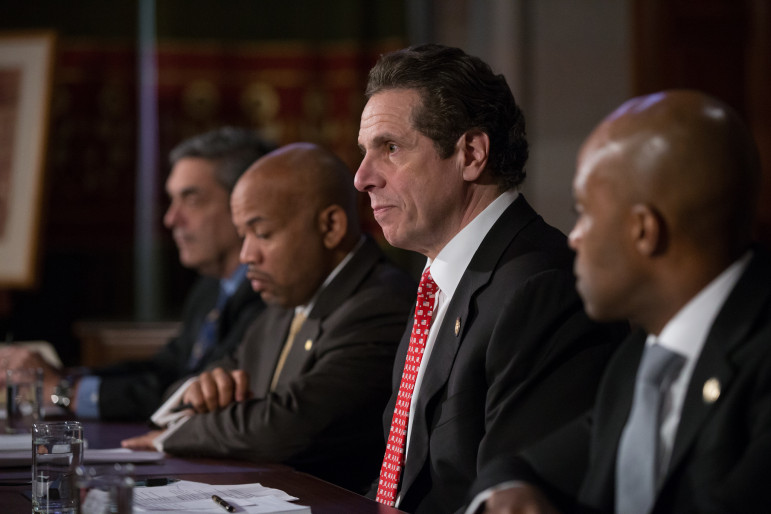
Office of the governor
Gov. Cuomo and Speaker Heastie announcing the ethics agreement that was a key factor in budget negotiations.
There was more money for NYCHA but no sign of a significant new commitment to supportive housing. Homeless programs received more funding but a bid to direct billions in bank settlements to housing initiatives fell short. With a multifaceted housing crisis playing out in the city that holds nearly half the state’s population, the fiscal 2016 state budget offered modest improvement in some areas and disappointment in others, according to reaction by housing advocates over the past days.
During the budget process, housing advocates pushed for three top goals: a commitment to a new supportive housing program to construct 35,000 units throughout the state, the use of $492 million from real-estate related settlement agreements to fund housing programs and deeper funding for homeless services.
Advocates largely struck out on the first two goals and claimed moderate success on the third.
The budget included $74.5 million for new supportive housing and $50 million to offset rent increases on existing supportive housing—far less than the major, new investment that was sought. The bank settlements were directed to infrastructure improvements and upstate economic development instead.
“Unfortunately, New York’s budget — despite beginning the year with a massive surplus — has done little to address our desperate homeless crisis,” said Jennifer Flynn, a member of Real Affordability for All, which said that money for supportive housing “falls significantly short for a statewide supportive housing agreement to build 30,000 units in NYC and 5,000 rest-of-state.”
The Supportive Housing Network of New York told its members: “Permanent supportive housing is a cost-effective resource proven to reduce homelessness for our most vulnerable neighbors who often languish for years on our streets. But today’s budget would actually create far less supportive housing units per year than the last agreement – NY/NY III – which was codified when homeless was half what it is today.”
It was not immediately clear how many new units of housing the budget would fund, in part because the state might be expecting the city to pick up some of the ongoing cost of operating supportive housing. As the mayor’s affordable housing program continues to get traction without a statewide supportive housing deal in place, some advocates worry that supportive housing might miss the boat.
The New York Housing Coalition, which led the fight to direct bank settlement money to housing, said it was “disappointed that none of the $5.4 billion in bank settlement surplus was directed to housing programs and that settlement recommendations specifically outlining uses for $492 million of the funds for housing were ignored.” But it did cheer a separate, earlier agreement to devote $439 million from a settlement with J.P. Morgan to housing efforts. (NYHC created this handy chart showing how different housing programs fared in the final budget.)
The budget did include $100 million in capital support for NYCHA, which faces an $18 billion capital backlog. A new middle income affordable housing program received $25 million. And New York City’s LINC rental assistance program will receive $40 million. “Today’s budget agreement includes welcome new investments in anti-homelessness initiatives – and we are grateful to the Assembly Majority for adding over $29 million in new funds to prevent homelessness,” said Mary Brosnahan, president and CEO of the Coalition for the Homeless.
To some degree, the budget was but a prelude to the real housing fight of the year: the debate over whether to revise or renew rent regulations, which expire June 15. Key real-estate tax breaks, like 421-a, are also up for reconsideration.








